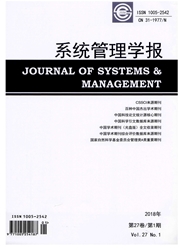

 中文摘要:
中文摘要:
制造系统在运行过程中不可避免地遇到内、外部环境的不确定性,这些不确定性直接影响到系统的运行成本、效率和质量。为了有效提升制造系统的柔性,需要对其柔性能力进行测度。制造单元是制造系统最基本的构成元素,在假定某制造单元中的各台机器能够以不同效率实现任务替代加工的基础上,建立了考虑制造单元柔性的效率属性、产品属性和冗余属性的多属性度量方法,该方法包含时间和成本的效率矩阵、任务概率、每台机器可加工的任务数量、任务在机器间一次指派和二次指派的概率,以及任务在机器间的替代比例和替代概率等困扰实际生产的因素。本制造单元柔性多属性测度方法有2个主要作用:①评价制造系统的现有柔性,以有针对性的提高系统的柔性能力;②发生生产扰动时,有效平衡损失和柔性重构建成本,降低投资风险。最后,结合具体算例对该方法的应用过程进行了分析。
 英文摘要:
英文摘要:
During its operations, manufacturing system inevitably encounters uncertainties from internal and external environments, and these uncertainties directly influence its operating cost, efficiency and quality. To effectively improve the flexibility of manufacturing systems, we need to measure the flexibility. A manufacturing cell is a basic element of manufacturing system, and assuming that each machine in one manufacturing cell can substitute others in processing tasks with different efficiency in case of disturbance occurring, we propose a multi-attribute method for flexibility measurement in manufacturing cell. The method takes into consideration of the efficient attribute, product attribute and redundancy attribute, and includes efficiency matrix (described with time and cost of processing a task), the number of different tasks which a machine can perform, each task probability for processing, probability of first and second task assignment among machines, the fraction of an task that can be transferred in case of disturbances, probability of task substitution between machines and other production factors faced in actual production. This multi-attribute measurement method has two main effects: first, evaluating the current flexibility of the manufacturing system to further improve the system's flexibility; second, in case of production disturbance, balancing the loss and cost for rebuilding flexibility and reducing investment risk. The manufacturing cell flexibility measurement method is verified with an example to show its application processes.
 同期刊论文项目
同期刊论文项目
 同项目期刊论文
同项目期刊论文
 期刊信息
期刊信息
